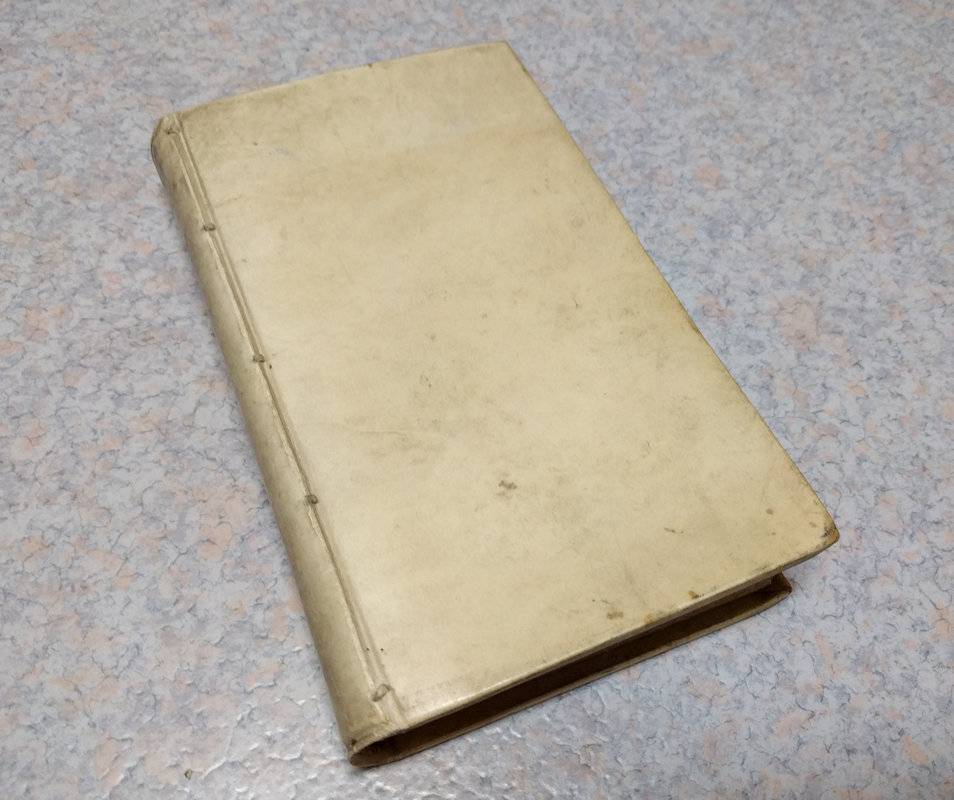CICERO.
M. Tullius Cicero, De Oratore ad fratrem. Ex MSS. recensuit Tho. Cockman e Coll. Univ. A.B. Editio secunda.
Oxford (Oxoniae), E Theatro Shelodiano, impensis Jo. Stephens; & prostant venales apud Ja. Knapton ad Insigne Coronae in Coemeterio D. Pauli Lond., 1706.
8vo. (XII, including the frontispiece),294,(44 index) p. Vellum. 20 cm (Ref: ESTC N12260; Schweiger 2,120; Dibdin 1,432.33; Fabricius/Ernesti 1,147; Ebert 4314; Graesse 2,161) (Details: 5 thongs laced through the joints. The frontispiece shows a bird's-eye view engraving of University College at Oxford, after the famous engraving of David Loggan in 'Oxonia Illustrata' of 1675. On the lower half of it an oval portrait of, as legend has it, the founder of University College in 872, King Alfred the Great. (See Wikipedia's article on 'University College, Oxford') This legend was accepted and promoted by the editor of this title, Thomas Cockman. § On the title an engraving of the Sheldonian Theatre) (Condition: Vellum age-tanned. 2 stamps on the front flyleaf. Frontispiece mounted. The lower margin of the first 4 preliminary leaves cut off and repaired with a strip of paper, with the loss of 2 or 3 letters. Stamp on the lower margin of the title) (Note: Wikipedia offers an interesting article on the editor of this edition of Cicero's 'De Oratore', Thomas Cockman, in which the appearance of Alfred on the frontispiece is also made clear. 'Thomas Cockman, Doctor of Divinity (1675-1745) was an Oxford academic and administrator. He was Master of University College, Oxford. (...) Cockman's mastership at University College was a contested one, with William Dennison, who also served as Master between 1722-29. There were two disputed elections held in 1722. Cockman appealed to the Crown and was declared Master of University College in 1729. The success of Thomas Cockman's appeal involved accepting that King Alfred had founded the College. This myth originated from the late 1380s but it was widely believed by Cockman's time. The ruling at the court hearing meant that the Visitor of University College, who is responsible for resolving such disputes, should be the Crown rather than the University. This event acted as the impetus for the college antiquary, William Smith, to write a history of the college, refuting this medieval myth. This materialised as 'The Annals of University College' (1578), the first scholarly Oxford history. Cockman received this book coldly, dismissing it as 'the private opinion of a partial disgusted old man, who was always famous for opposition and confounding thing'. § For centuries the Roman orator, author and politician Cicero retained a central position as a school author and a model for good writing, on protestant schools and in Jesuit colleges. The period of his greatest glory was the Renaissance, when the importance and influence of his works was enormous, and Cicero became the object of a literary cult called Ciceronianism. Cicero's treatises on rhetoric and style gave rise to a surge of polemics on the imitations of classical authors. Many humanists took him as an absolute model for pure Latin, and an elegant style. Cicero also exercised 'an amount of influence on European thought comparable to that of Plato and Aristotle'. (H.J. Rose, 'A Handbook of Latin literature', London 1967, p. 184) . § Until this day rhetoric moves forward by looking to the past, especially to Cicero's inspirational work on rhetoric 'De Oratore', a work in the form of a platonic debate regarding the rules of the orator's profession, i.e how the perfect orator may be formed. § Cockman's 'De Oratore' of 1706, announced on the title as a second edition, is, apart from the title page, exactly the same as the edition he previously published in Oxford in 1696. The University Press simply replaced the title page of unsold copies, pretending it to be a second edition. In the preface to his edition Cockman tells the reader that he based the text on Jacobus Gronovius' Leiden edition of 1692. He adopted Gronovius' interesting notes concerning manuscripts, but omitted his nonsensical and superfluous observations and notes. ('rejecta illa reliqua, plerique inani, verborum farragine'. (p. b1 recto)) Cockman furthermore consulted and collected, he tells, the variant reading that he found in 6 other manuscripts owned by the Bodleian and other Oxford Colleges. Cockman himself seems also to be a typical example of a kind of inane and superfluous scholarship, idly displaying his familiarity with the manuscript evidence, hoping thus to confer authority on his text. He also reduced the problem of manuscript accessibility, judging, as most scholars of his time, manuscripts according to their availability rather than their quality) (Provenance: Stamp of 'St. Aloisius College, 's Gravenhage' on the front flyleaf. This school was named after the sanctified Jesuit Aloysius Gonzaga, and founded in The Hague in 1917. § Small paper label on front pastedown: 'Bibl. Gymn. Catv.' This must be the 'Sint Willibrordus Gymnasium' in Katwijk. The Jesuits established in 1831 a gymnasium for young gentlemen of the cultured class in the country estate ''t Sandt aan de Overrijn', near the Dutch city of Katwijk. The name of the school 'Gymnasium Sancti Willibrordi', or 'St. Willibrordus College' refers to the Northumbrian monk Willibrord, ca. 658-739, known as 'Apostle to the Frisians', who brought christianity to the Low Countries. The school was relocated to The Hague in 1928. (See canonvankatwijk.nl/venster/het-heerenschool) (Collation: a4, b2; A-2N4, 2O4 (minus leaf 2O4; this leaf was originally blank and was to be removed, as is evident from the catchword at the end of leaf 2O4 'variantes', which refers to the beginning of leaf 2P. In the ESTC copy this leaf was used to add some corrections, later during the printing process), 2P-2T4, 2V2) (Photographs on request)
Book number: 157922 Euro 175.00
Keywords: (Oude Druk), (Rare Books), De Oratore, English imprints, Latin literature, Oxford, Rhetorik, University College Oxford, antike altertum antiquity, rhetoric, römische Literatur
 CICERO.
CICERO.